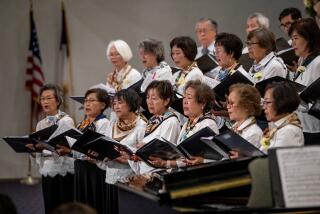Some Churches Complain : Missionaries Compete to ‘Save’ Tongan Souls
- Share via
NUKU'ALOFA, Tonga — The first Christian missionaries came here nearly two centuries ago on sailing ships; now they come by jet. They once preached under palm trees, on beaches and in villages; now they use television.
Tongans killed three of the first six missionaries who landed here in 1796 and it took the missionaries 40 more years to make inroads.
Today more than 95% of Tonga’s 96,000 Polynesian people are Christians and the nation is considered a model of missionary success.
The national flag has a red cross in a white field in its upper left corner. The national anthem is “O Almighty God Above” and the constitution ordains that people keep holy the Sabbath day.
Plenty of Newcomers
That means no work, no shopping, no sports and no taxis or buses. But although the early missionaries came to convert heathens, new ones coming on jet planes are competing for members of the long-established Roman Catholic and Protestant churches.
Leaders of the established churches say they are not happy with the newcomers.
“We used to have only five main religions, Wesleyan, Free Church of Tonga, Catholics, Anglicans and Seventh-Day Adventists,” said Dr. Sione Amankai Havea, president of the Methodist Free Wesleyan Church, which claims to have as members 43% of the population, including King Tauaufa’ahau Tupou IV.
“Unfortunately there are now many more, including the Salvation Army, the Assembly of God, Mormons, various Pentecostals, American cults, two local cults,” Havea said. “Even Islam has tried to establish here.”
Competition for Souls
The spiritual competition is evident in the new churches and temples in this capital and in almost every village of the 36 inhabited islands of the Tonga group, about 2,000 miles northeast of Sydney, Australia.
The Catholic Church has a cathedral as well as a basilica, each of which could hold the entire Catholic population of the one-street town.
The Free Wesleyan Church, the Free Church of Tonga--a breakaway from the Methodist Church--and the Mormons also have large cathedral-like churches and temples.
The church buildings stand out against the ramshackle one- and two-story buildings of the main island where the annual per-capita income is $1,002 and the $19 million sent home last year by Tongans abroad keeps the country financially afloat.
Mormons Growing
The Church of Jesus Christ of Latter-Day Saints, or Mormon Church, is giving the established churches the most competition. Mormons now claim 30% of the population as adherents, making it the second- largest group in the islands.
Havea and Bishop Patelisi Finau of the Catholic Church claim Tongans are attracted to the Mormon Church by its apparent wealth and the prospects of scholarships in the United States, a charge the Mormons vigorously reject.
Havea, a Tongan who likes to go barefoot and wear the traditional sarong, said the Wesleyans have adopted the Mormon missionary tactic of sending two-member teams on home-to-home visits in villages to win people over to the church.
Seen as Challenge
“When they go two by two, we go two by two,” Havea said.
“It’s a big challenge to us. We have 30 Wesleyan teams at work. They take our literature and distribute it, create a dialogue with the villagers and answer questions about our teachings.
“We’re copying the Mormon methods. It’s working. We are winning back some of our families.
“They (Mormons) have all the money,” he said. “They have built churches in well over two-thirds of the 140 villages here. They offer scholarships and make it easier to get visas to the U.S.”
Bishop Finau, also a Tongan, said Mormon funding allowed Mormons here to build basketball courts with floodlights next to their churches, which proved a big attraction to Tongans.
‘Easier Ground’
“People are attracted when they see buildings like these,” he added. “The Mormons are perceived as a wealthy church, and for a poor people this is very attractive. So is the opportunity of going to the U.S.
“Tonga is easier ground to work for a missionary than a country with very few Christians. It’s a great field for harvesting,” Finau said.
More to Read
Sign up for Essential California
The most important California stories and recommendations in your inbox every morning.
You may occasionally receive promotional content from the Los Angeles Times.













